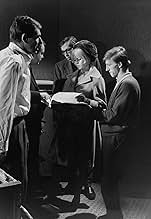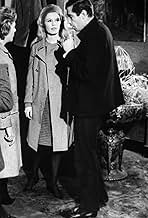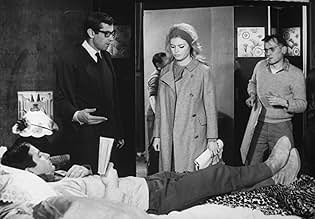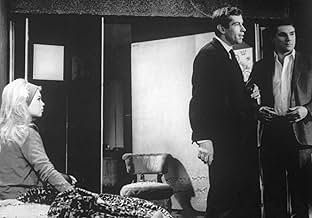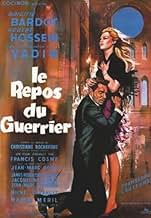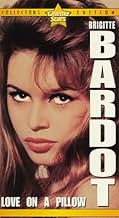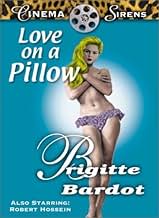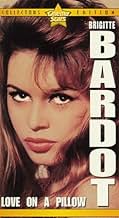Une jeune fille sauve un homme d'une tentative de suicide. Il s'avère être un sociopathe, qui commence à prendre le contrôle de sa vie, la maltraitant verbalement et émotionnellement, mais e... Tout lireUne jeune fille sauve un homme d'une tentative de suicide. Il s'avère être un sociopathe, qui commence à prendre le contrôle de sa vie, la maltraitant verbalement et émotionnellement, mais elle ne semble pas pouvoir se détacher de lui.Une jeune fille sauve un homme d'une tentative de suicide. Il s'avère être un sociopathe, qui commence à prendre le contrôle de sa vie, la maltraitant verbalement et émotionnellement, mais elle ne semble pas pouvoir se détacher de lui.
- Réalisation
- Scénario
- Casting principal
- Raphaële
- (as Macha Meril)
- Katov
- (voix)
- Le patron de l'hôtel
- (non crédité)
- Madame Pia - la concierge
- (non crédité)
- Armand
- (non crédité)
- Le gros serveur
- (non crédité)
- Le vieil homme dans le train
- (non crédité)
Avis à la une
One would think he would be grateful and perhaps fall in love with his beautiful benefactress. What happens is just the opposite. She falls into a kind of obsessive, almost masochistic, love with him, but all he feels for her is indifference. He spends her money, drinks to excess, abuses her verbally and emotionally. But she can't let him go regardless of what he does. Yes, this is a familiar premise, and frankly I would not have stuck around long enough to see how it plays out except for Brigitte Bardot.
If you haven't seen her, you might want to watch this just to take a look at her. She is strikingly beautiful and amazingly sexy. She has pretty, almost perfect features and a soft and sweet way about her; but perhaps the most arresting thing about her is her figure. It is absolutely exquisite. She was a sensation in the fifties not only in France but in the US as the quintessence of the "sex kitten," in some ways even more so than, say, Marilyn Monroe or Tuesday Weld.
Roger Vadim, who would later direct Jane Fonda in Barbarella (1968) was married to Bardot at the time this movie was made. (He would later marry Jane Fonda.) Like some other French directors, Vadim liked to make movies which amounted to adorations of the beautiful young star. See Roman Polanski with, e.g., Nastassja Kinski in Tess (1979); Krzysztof Kieslowski with Irene Jacob in La Double vie de Véronique (1991) and Trois couleurs: Rouge (1994); and Andre Techine, with Juliette Binoche in Rendez-vous (1985) for some comparisons. Naturally if you make movies in which the camera adores the young actress and shows her in her best light, you are going to attract young actresses! Here Vadim directs in a studied manner designed to not only show off Bardot's exquisite beauty but to highlight her ability as an actress. Although not among the first rank as actresses go, Bardot performs well here. Perhaps this is her best film. She is elegantly dressed and coiffured, and Vadim treats us to many close ups of her lovely face. (If there is a more beautiful woman in filmdom, I haven't seen her.) But don't expect to see much of her equally lovely body or any kinky sex. This film could easily pass for PG-13.
Vadim creates an early sixties French atmosphere as he recalls the jazz/beat scene from that era, but he does so in a superficial, almost euphemistic way. In the elaborate scenes at Katov's apartment and then at his estate, we are given a hint of the decadent indulgence of a certain class of French society in which privilege, jazz, heroin, pot and easy sex are the rule, but Vadim keeps it all off camera except for one scene in which a joint is passed around.
Vadim's most famous film starring Brigitte Bardot is Et Dieu... créa la femme (And God Created Woman) (1956). This is not to be confused with Vadim's American version of the film from 1988 starring Rebecca De Mornay, which was not very good.
Bardot retired fairly young and devoted her life to helping animals.
(Note: Over 500 of my movie reviews are now available in my book "Cut to the Chaise Lounge or I Can't Believe I Swallowed the Remote!" Get it at Amazon!)
Today, seeing the film again, I found it almost stupid. I explain.
1. The revolt of Renaud is not explained in a context, so we don't know exactly why he is bitter, cynic, self destructive and iconoclast.
2. The author of the story tries to glamorize Renaud revolt, but, what I see can't be glamorized. For instance, Renaud wears the same unwashed clothes during several weeks (which seems to be the time the story lasts) doesn't take a bath and doens't shave his beard. He smokes all the time and drinks heavily since the time he wakes up. So, his clothes and his breath certainly stink disgustingly. He messes seriously Geneviève's apartment spreading all around dirty dishes and ash trays stuffed with smoked cigarettes. All this mess and dirtiness for nothing... or to punish unjustly Geneviève?
3. Geneviève looks rather as stupid blonde female because she falls in love with a stinking revolted pseudo-existentialist who does't do anything useful to anyone and criticize hardly the middle class life style, middle class of which he is actually a parasite.
The film deserves to be seen because of the presence of BB. She was marvelous by that time and a real icon of a generation. A queen of many dreamers as me.
For what it's worth, it tells of a bourgeois girl (Bardot) shortly to be married to an unassuming young man travelling from Paris to Dijon to hear the will of her late aunt, who accidentally stumbles on the suicide attempt of a bohemian, pulp-thriller-loving misanthrope (Robert Hossein) who, upon recovering, literally turns her life upside down. The cast is completed by James Robertson Justice (as Hossein's sculptor friend), Macha Meril (as Robertson's tramp companion) and, in one sequence, Michel Serrault as a notary.
In the end, the original title of THE WARRIOR'S REST sounds far more interesting that what's on offer here and the fact that I was misinformed about the film's running time I thought it was a good 22 minutes shorter! did not help to earn it much affection from my end. But, then, the sight of Bardot in her prime (and, Vadim being Vadim, in various stages of undress as well) is always welcome...
Although there is indeed a plot (a rather interesting one, if you ask me), the power of this film lies not in the story but in the script and in the subtle, almost indecipherable fragments of philosophy we experience through these two highly complex characters.
Geneviève (Bardot) is the the romantic. Her counterpart Renaud (Hossein) is the cynic. The collision of their worlds causes a catastrophic upheaval in both of their lives. But it is undeniable that they need each other, just as the two opposing philosophies rely on each other. Sort of a yin-yang thing. At times they are at war with each other; at times they cling to each other for life; at times they threaten to annihilate the other absolutely. This is some really heavy stuff that cannot possibly be summarized in a few paragraphs, so I won't even try.
There are several monologues which are so stirring I want to learn them by heart. Particularly the last two speeches in the final 10 mins of the film. Pay close attention to those words, because they sum up the entire theme of the film. Powerful. Powerful.
In the USA Easy Rider was one of the first films where people smoked pot ("without raping a nurse" as Dennis Hopper stated), Vadim showed it almost 6 years earlier! He was quite hip and brave to make the film, dealing with a mental disease which is still under the carpet 50+ years later, in the first place. Not many people care for depressive persons. His ex-wife BB had some understanding as well of course, she tried to kill herself a year before the film was made.
Le saviez-vous
- AnecdotesThe encore for this film, composed by Michel Magne, was later used in 1968 by Frida Boccara in her single "Cent Mille Chansons". This version, now with lyrics, was written by Eddy Marnay.
- Citations
Renaud Sarti: Our lives on this earth are pointless.
Geneviève Le Theil: Speak for yourself.
Renaud Sarti: I am.
- ConnexionsFeatured in Le mystère Bardot (2012)
Meilleurs choix
- How long is Love on a Pillow?Alimenté par Alexa
Détails
- Durée
- 1h 42min(102 min)
- Rapport de forme
- 2.35 : 1

